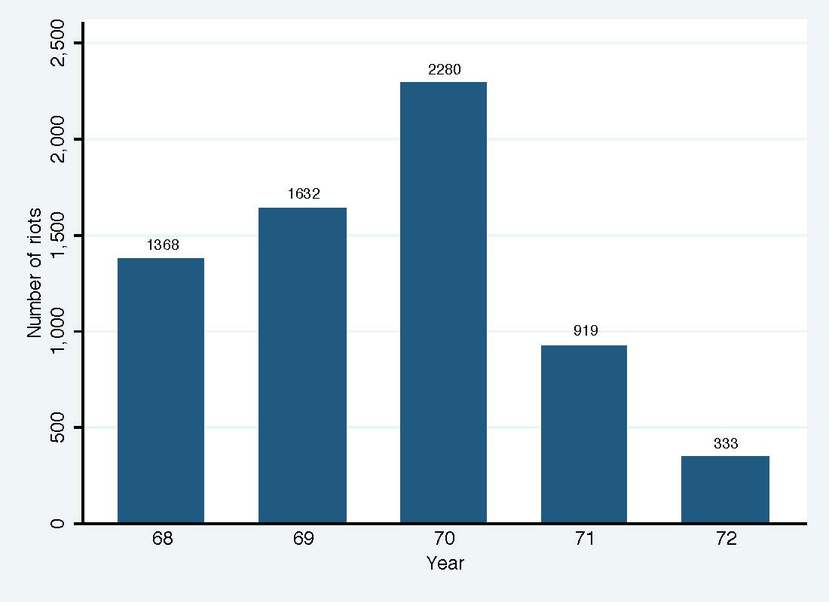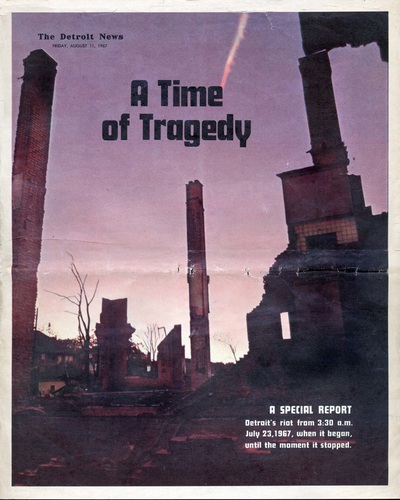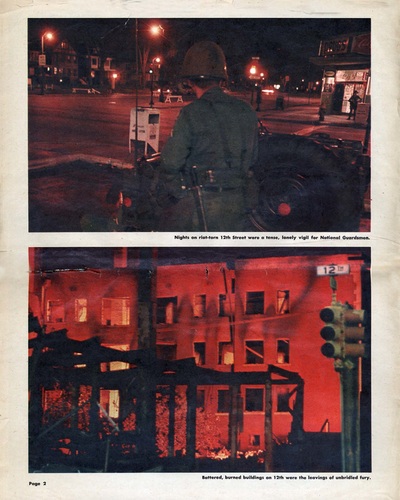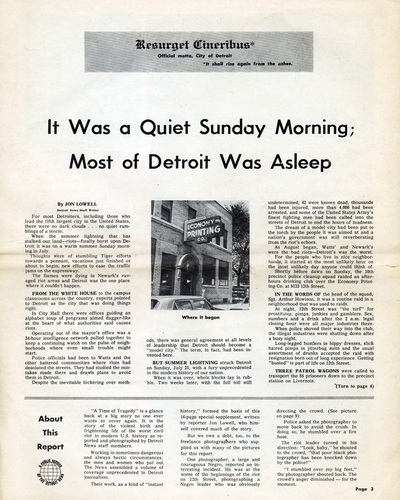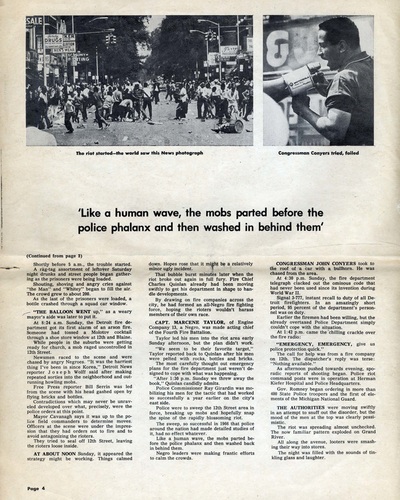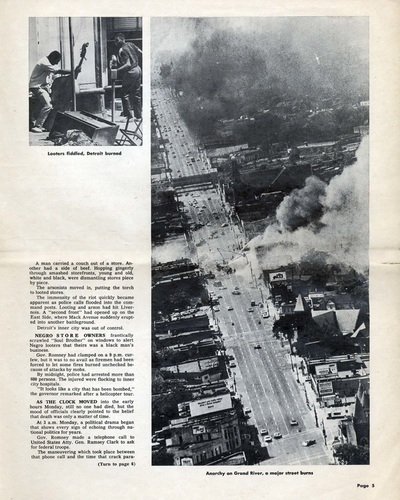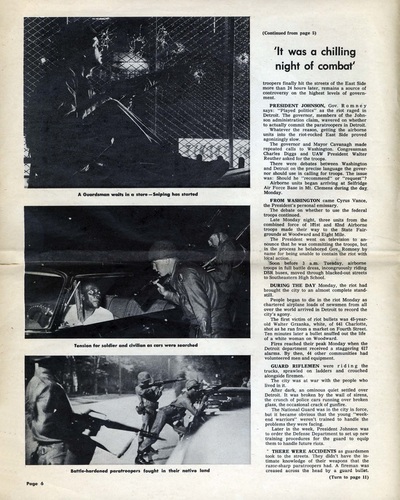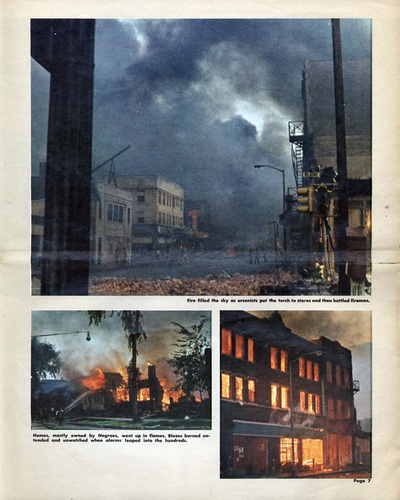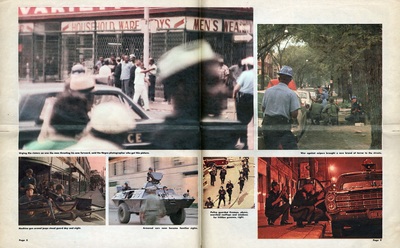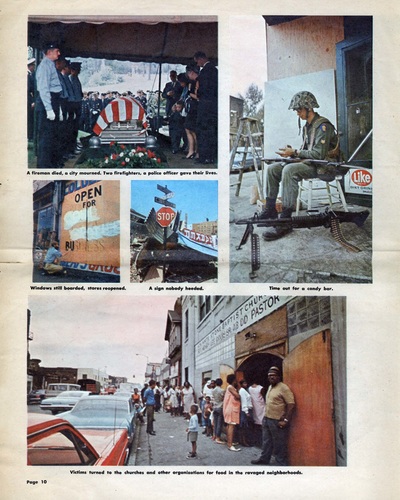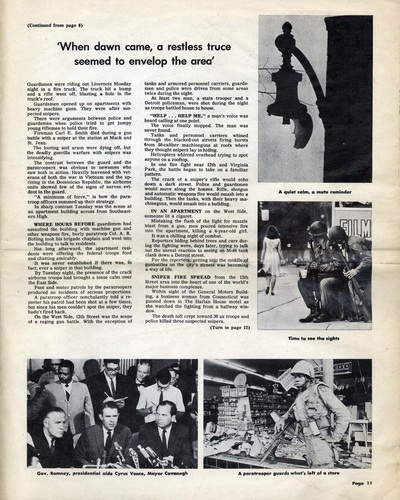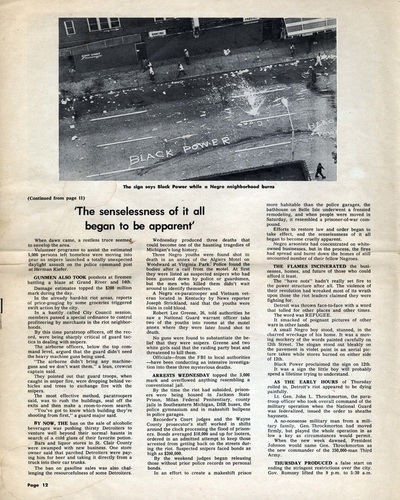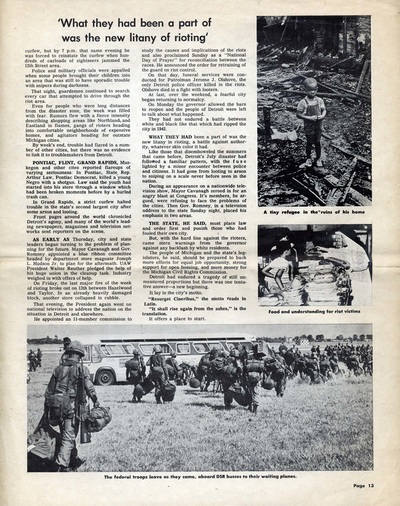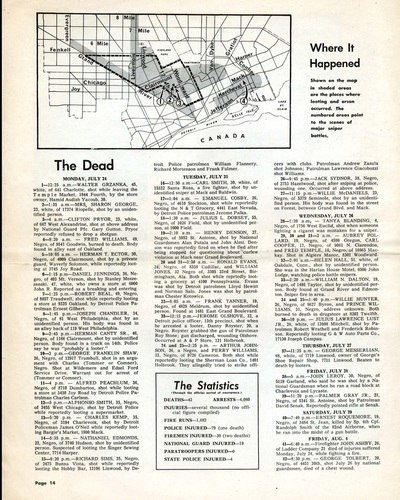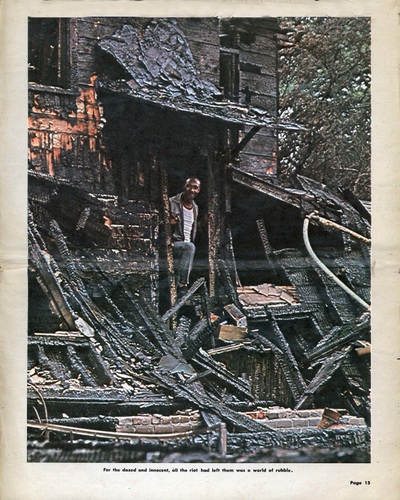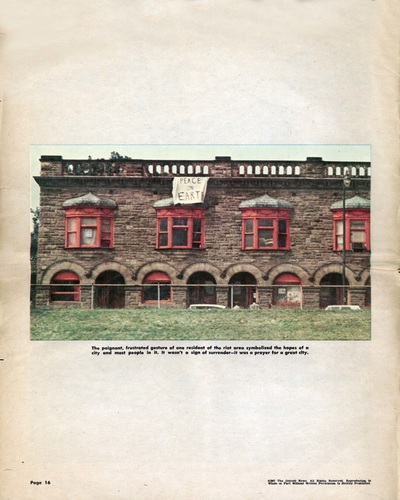Urban Disturbances (Riots, Rebellions and Unrest)
Introduction
The information provided here was initially compiled by the Lemberg Center. The origin of the Center is intriguing:
The Lemberg Center... was founded in response to another assassination-that of John F. Kennedy. Shortly after this event, Frank A. Cohen, a New York businessman, offered money to Brandeis for scholarly research on violence; the funds were used to hold three conferences in 1964 and 1965. Because of the interest they generated in the university and elsewhere, it was decided to sponsor a permanent center, which was opened
in the autumn of 1965. In 1967, another New York businessman, Samuel Lemberg, as a permanent endowment for the Center. Although the Lemberg Center was founded in response to an act of individual violence against President Kennedy, the focus of its research is on collective violence, particularly race-related urban violence.
After this:
From 1965-1973, the Lemberg Center for the Study of Violence at Brandeis University collected data and conducted research dealing with social violence, particularly race riots, in America. It was founded in the wake of a series of conferences held at Brandeis concerned with the place of violence in the United States in the wake of the assassination of President John F. Kennedy. The Center’s director, Dr. John P. Spiegel, and associate director, Ralph Conant, led researchers, including Terry Ann Knopf, in large-scale projects treating urban violence that encompassed interviews, surveys, and analysis of media reports from cities across the country, with the principal goal of finding a model for such violence. The Lemberg Center included a Riot Data Clearinghouse, which supplied regular information for its Riot Data Review publication. Figures such as Daniel Patrick Moynihan and Rev. John Drinan served on the center’s board of overseers. The Center further sought to publicize its research, both through its own publications and via mass media. It would close in 1973, following the downturn in rioting and a reduction in funding. Between 1979-1998, a portion of the Center’s archives were held by Manchester University (IN), and from 1998 until their return to Brandeis in 2015, they were loaned to the University of Notre Dame (under the direction of Prof. Dan Myers).
The last part was partially accurate, however, as Prof. Dan Myers passed some of the archival material to Prof. Christian Davenport who was at Notre Dame at the same time as Prof. Myers. This was done so that Davenport could assist in the completion of the effort that Myers initiated, including the creation and distribution of a database on 4000 urban disturbances that were extracted from the archival material collected by the early Center effort, the digitization of the numerous recordings contained within the records as well as the digitization of the raw material underlying the database (i.e., an extensive newspaper clipping from the relevant time period).
Enjoy
[Christian Davenport]
Professor of Political Science - University of Michigan
Faculty Associate - Center for Political Studies, Institute for Social Research
Research Professor & Global Fellow - Peace Research Institute Oslo (PRIO)
Director - Radical Information Project (RIP)
Director - Stop Our States (SOS)
Co-Founder - New Jack Academics with Professor Darren Davis
Co-Founder - .EDU: opening minds & changing worlds with style with Professor Jillian Schwedler & Rodney Williams
Co-Founder/Director - Conflict Consortium (CC) with Professor Will Moore
The Lemberg Center... was founded in response to another assassination-that of John F. Kennedy. Shortly after this event, Frank A. Cohen, a New York businessman, offered money to Brandeis for scholarly research on violence; the funds were used to hold three conferences in 1964 and 1965. Because of the interest they generated in the university and elsewhere, it was decided to sponsor a permanent center, which was opened
in the autumn of 1965. In 1967, another New York businessman, Samuel Lemberg, as a permanent endowment for the Center. Although the Lemberg Center was founded in response to an act of individual violence against President Kennedy, the focus of its research is on collective violence, particularly race-related urban violence.
After this:
From 1965-1973, the Lemberg Center for the Study of Violence at Brandeis University collected data and conducted research dealing with social violence, particularly race riots, in America. It was founded in the wake of a series of conferences held at Brandeis concerned with the place of violence in the United States in the wake of the assassination of President John F. Kennedy. The Center’s director, Dr. John P. Spiegel, and associate director, Ralph Conant, led researchers, including Terry Ann Knopf, in large-scale projects treating urban violence that encompassed interviews, surveys, and analysis of media reports from cities across the country, with the principal goal of finding a model for such violence. The Lemberg Center included a Riot Data Clearinghouse, which supplied regular information for its Riot Data Review publication. Figures such as Daniel Patrick Moynihan and Rev. John Drinan served on the center’s board of overseers. The Center further sought to publicize its research, both through its own publications and via mass media. It would close in 1973, following the downturn in rioting and a reduction in funding. Between 1979-1998, a portion of the Center’s archives were held by Manchester University (IN), and from 1998 until their return to Brandeis in 2015, they were loaned to the University of Notre Dame (under the direction of Prof. Dan Myers).
The last part was partially accurate, however, as Prof. Dan Myers passed some of the archival material to Prof. Christian Davenport who was at Notre Dame at the same time as Prof. Myers. This was done so that Davenport could assist in the completion of the effort that Myers initiated, including the creation and distribution of a database on 4000 urban disturbances that were extracted from the archival material collected by the early Center effort, the digitization of the numerous recordings contained within the records as well as the digitization of the raw material underlying the database (i.e., an extensive newspaper clipping from the relevant time period).
Enjoy
[Christian Davenport]
Professor of Political Science - University of Michigan
Faculty Associate - Center for Political Studies, Institute for Social Research
Research Professor & Global Fellow - Peace Research Institute Oslo (PRIO)
Director - Radical Information Project (RIP)
Director - Stop Our States (SOS)
Co-Founder - New Jack Academics with Professor Darren Davis
Co-Founder - .EDU: opening minds & changing worlds with style with Professor Jillian Schwedler & Rodney Williams
Co-Founder/Director - Conflict Consortium (CC) with Professor Will Moore
Codebook for Data Collection Effort
| urban_disturbances_codebook.pdf | |
| File Size: | 133 kb |
| File Type: | |
Data (CSV format)
| urbandisturbancesdata.csv | |
| File Size: | 5664 kb |
| File Type: | csv |
The Temporal Distribution of the Disturbances
The Lemberg Collection
The Lemberg collection comes with a wide assortment of materials. Some are autograph discs, some are cassette recordings, some are Grundig E3 recordings and some were reel to reel. I have provided several examples of the recordings. Over the next several months, I will release more of them.
